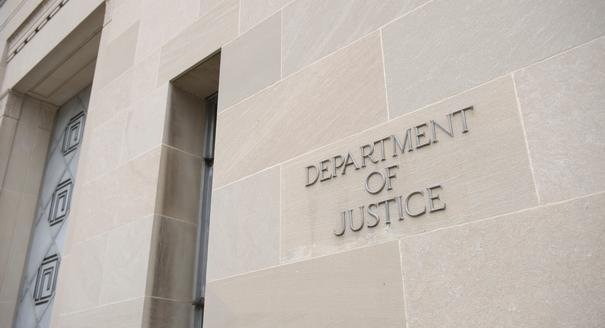The U.S. Department of Justice is objecting a New York magistrate judge's decision to deny its motion to compel Apple's assistance in unlocking an iPhone linked to a years-old New York drug case, with the case now landing at the Eastern District of New York.
The Justice Department's memorandum of law, filed on Monday, requests the district court, in its supervisory authority, reconsider a previous application leveraging the All Writs Act, which would require Apple's aid in bypassing the passcode lock of an iPhone owned by suspected drug trafficker Jun Feng. Federal Magistrate Judge James Orenstein issued an order denying the motion last month, portrayed in the media as a blow to the government's position in a broader encryption debate.
In October, the Justice Department filed an All Writs motion to compel Apple's help in breaking into Feng's iPhone 5s running iOS 7, a device that could potentially hold locally-stored information related to an ongoing court action. At the time, the Federal Bureau of Investigation said Apple initially agreed to cooperate, as it had done at least 70 times before, but later flip-flopped due to public relations concerns.
As noted by Apple in a report regarding government requests for information published to its webpage in 2013, the company only complies with orders for data retrieval when it is "satisfied that the court order is valid and appropriate." The government argues Judge Orenstein forced Apple's hand by deferring the AWA request, instead calling on Apple to offer a briefing on the technical feasibility and burden of complying with the proposed order.
Reuters reported on the development earlier today.
For his part, the magistrate judge said there are larger issues at play in this particular case, and in his original ruling voiced concern over the FBI's use of All Writs and other judicial instruments.
"It is also clear that the government has made the considered decision that it is better off securing such crypto-legislative authority from the courts (in proceedings that had always been, at the time it filed the instant Application, shielded from public scrutiny) rather than taking the chance that open legislative debate might produce a result less to its liking," Judge Orenstein wrote.
Apple and the Justice Department are embroiled in a contentious court battle over consumer device encryption that most recently sparked a wider debate on how best to balance personal privacy with national security. Like the New York case, the FBI is currently seeking an AWA-based motion to compel Apple's assistance in cracking a passcode-encrypted iPhone 5c used by San Bernardino terror suspect Syed Rizwan Farook.
 Mikey Campbell
Mikey Campbell







-m.jpg)






 Charles Martin
Charles Martin
 Christine McKee
Christine McKee
 Wesley Hilliard
Wesley Hilliard
 Malcolm Owen
Malcolm Owen
 Andrew Orr
Andrew Orr
 William Gallagher
William Gallagher
 Sponsored Content
Sponsored Content








12 Comments
Court:

all writs its act doesn't let you do that. FBI:
then we will keep filing all over the nation until we get someone who "reinterprets" it our way. The the entire planet:
ORLY?
Poor US govt being inconvenienced by pesky laws!
We should get rid of the constitution, and the façade of democracy while we're at it!
The government will keep going until it gets a win (in which case Apple will appeal) or it loses (in which case it will appeal) until this case gets to the SCOTUS. If not in this case, another.
Might as well send it right there, right now.
SCROTUS?
With any luck, they can add the important "Cyber Cooties" argument promoted by the San Bernardino DA. I'm sure the courts will find that compelling when combined with the Cyrus Vance "I'll stomp my feet and hold my breath until I turn blue" argument.